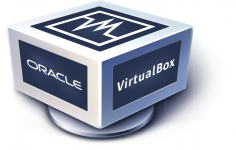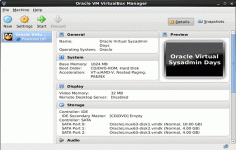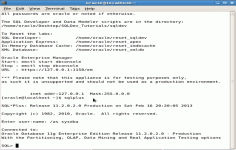 VirtualBox 1.6.2
VirtualBox 1.6.2
Oracle - (Open Source)
VirtualBox is an easy and elegant solution for those who want to control a computer from another computer.
VirtualBox offers virtualize your operating system (OS) guests on a host machine. Called hypervisor, the application supports Windows OS X, Linux, Mac, Solaris, FreeBSD, etc.. as host, Mac OS X missing the call as a guest.
It also includes a remote access via HTTP protocol, convenient for demonstrations on a clean system. The ability to manage multiple states of the system is particularly interesting and its interface is very simple.
Virtualization solutions allow installing an operating system on a virtual machine using the resources of the host PC , thus enjoying very good performance. In the genre, several solutions are known for their ease of use, such as VMware Workstation , Parallels Desktop or Microsoft Virtual PC 2007 SP1.
A virtual machine is a useful way to use two operating systems simultaneously and harmless to the host computer. There is the possibility to install Linux on a virtual machine on Windows and vice versa .
- Title:
- VirtualBox 1.6.2
- File Size:
- 22.5 MB
- Requirements:
- Windows XP
- Language:
- en-us
- License:
- Open Source
- Date Added:
- 06 Jun 2008
- Publisher:
- Oracle
- Homepage:
- http://www.oracle.com
- MD5 Checksum:
- E5A5EBBC81D92DD1F2B8A780E0E339CB
This is a maintenance release. The following items were fixed and/or added:
* GUI: fixed a bug which prevented to add more than one SATA drive from the GUI
* GUI: fixed a regression introduced in 1.6.0: the fullscreen mode was left on every guest video mode switch
* GUI: fixed several minor issues
* Networking: fixed a host interface networking regression introduced in 1.6.0
* VMM: fixed starting of VMs with AMD-V enabled
* VMM: massive performance enhancements for AMD-V
* VMM: stability improvements for AMD-V on Windows hosts
* VMM: correctly detect AMD CPUs with erratum 170 (AMD-V)
* VMM: detect inconsistent timestamp counters on certain AMD Phenom CPUs (Windows host only)
* VMM: fixed KVM check (Linux hosts only) XPCOM: fixed several races
* VMM: xed a regression introduced in 1.6.0: Windows stuck during installation
* SATA: improved performance with Vista guests
* SATA: fixed statistics counter
* Shared Folders: several fixes (iTunes download, speed up browsing)
* ATA/IDE: fixed boot from CDROM if a medium was added while the boot menu was active
* Networking: provide an Intel PRO/1000 T Server (82543GC) network device emulation which is recognized by Windows XP guests
* Networking: fixes for the E1000 emulation (don't crash if not attached, fixed a bug in the statistics counter implementation)
* NAT: don't crash if the guest sent a DHCPRELEASE message with an invalid IP address
* NAT: fixed ARP reply for the NAT gateway and for the NAT name server if the guest IP range was changed
* Internal Networking: fixed shutdown if more than two VMs are connected to the same network
* BIOS: allow to change the DMI informatiton (see chapter 9.13, Con'guring the BIOS DMI information, page 125)
* RTC: fixed UIP emulation to prevent jumping of time in Solaris guests
* Windows host: VirtualBox installation directory corrected for 64 bits Windows
* Windows host: fixed VBoxVRDP.exe symlink
* Windows host: solved locking problems in raw partition VMDK support
* Windows host: fixed stability during high system load (page fault in KeQueryActiveProcessors)
* MacOS X host: fixed crashes under certain conditions
* Shared Folders: limited users without admin rights now also can use Shared Folders on Windows guests
* Linux hosts: fixed default runlevel for the kernel module helper script
* Solaris hosts: enabled support for VT-x and AMD-V
* Solaris hosts: dynamic loading of libdlpi fixes a problem where Solaris 10 was not able to start a VM
* Linux additions: fixed runlevels for kernel module helper scripts
* Linux additions: compatibility fixes with Linux 2.6.26
* Linux additions: fixed occasional guest kernel crash during unload of the vboxadd guest kernel module
Related software
0.1/5 from 1120 users


